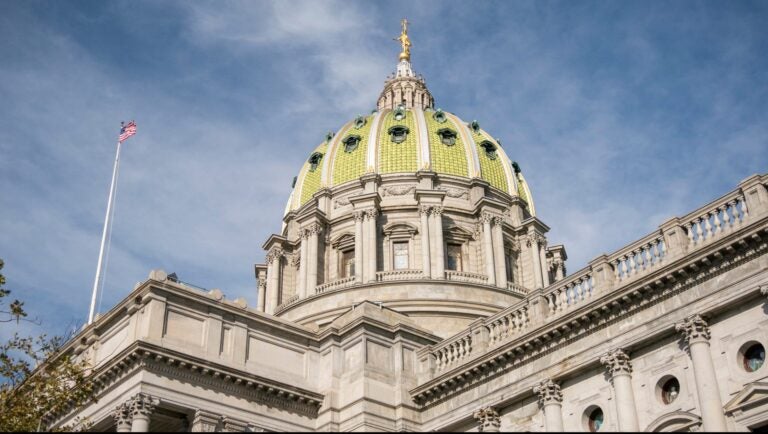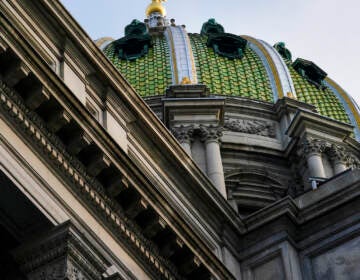Talks yield no Pennsylvania budget deal, with 3 days left
Without new budget legislation signed into law by Friday, the state will lose the authority to make many discretionary payments.

The Pennsylvania state Capitol is seen in this file photo. (Tom Downing/WITF)
Pennsylvania’s state House of Representatives and Senate returned to the Capitol on Tuesday, as leaders of the Republican-controlled chambers work to get an agreement on a roughly $42 billion budget plan with Democratic Gov. Tom Wolf before the state loses some of its spending authority in three days.
No budget plan has been unveiled, and hundreds of pages of budget-related legislation remained under wraps. Closed-door talks were still going on as Senate Republicans warned in a Monday afternoon statement that they were still “far apart” with Wolf’s office.
Without new budget legislation signed into law by Friday, the state will lose the authority to make many discretionary payments, although it could be weeks before any effect is felt.
Wolf’s budget secretary, Greg Thall, said Tuesday that a budget deal is within reach and that there is no reason to miss the end-of-fiscal-year deadline on Friday.
Still, the ongoing stalemate has begun to revive memories of protracted, months-long budget fights between Wolf and the Republican-controlled Legislature in 2015 and 2017 that inflicted lasting stress on counties, schools and social services agencies, and precipitated another credit downgrade.
Senate Republican lawmakers have been particularly tight-lipped, and Wolf has generally stayed out of sight in the Capitol.
The talks revolve around the amount of money Wolf is seeking for public schools, after he asked for almost $1.8 billion more for instruction, operations and special education, or about 21% more. Of that, $300 million was set aside for the 100 poorest public school districts and $200 million for special education.
Thall would not discuss what sort of concessions Republican lawmakers were seeking from Wolf. However, he said the state is awash in billions of dollars in surplus revenue and that lawmakers should act to help “people who are struggling in the economy.”
Republican leaders are willing to send more money to public schools, but perhaps one-third to one-half of the amount Wolf requested. The state must be wary of overspending with an economic slowdown possibly on the way, they say.
Greasing the skids this year is a massive influx of tax receipts leaving the state’s bank accounts flush with — by some estimates — $12 billion in reserves and surpluses, boosted by inflation and an economy juiced with federal pandemic subsidies.
Despite the state’s brimming bank accounts, budgetmakers are not discussing a broad-based tax cut in sales or income as part of the budget.
Cutting corporate taxes, however, is a central part of budget talks, as is expanding the state’s property tax and rent rebate program, which is open to people 65 and over, widows and widowers 50 and over and disabled people 18 and over.
In a long-term stalemate, the state is legally bound to make debt payments, cover Medicaid costs, issue unemployment compensation payments, keep prisons open and meet biweekly payrolls, state officials said.
But Wolf’s administration could postpone payments to vendors, such as utilities, insurers, suppliers and landlords, and put off paying discretionary items, such as tax credits, grants and public school aid.
WHYY is your source for fact-based, in-depth journalism and information. As a nonprofit organization, we rely on financial support from readers like you. Please give today.






